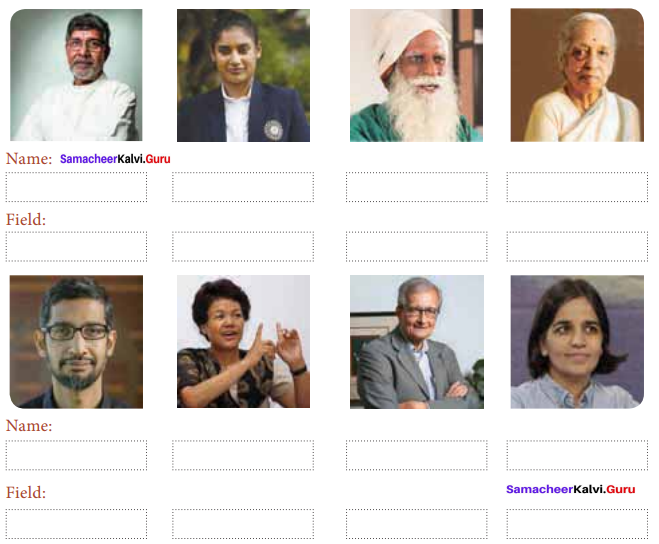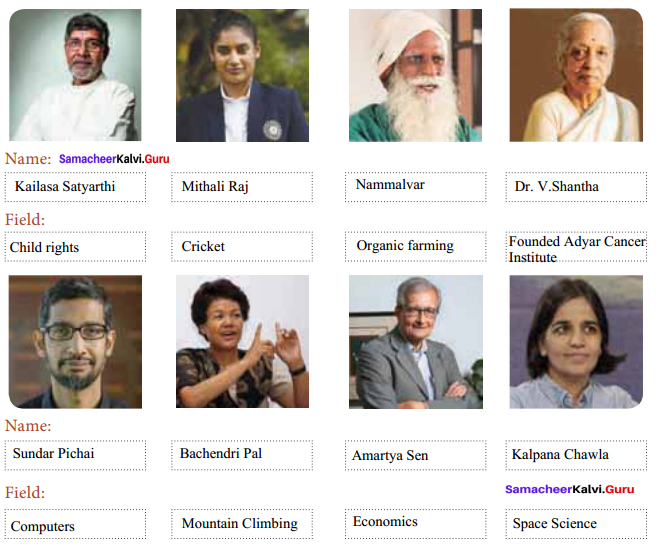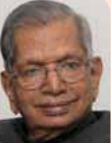Students can Download English Poem 5 Everest is not the Only Peak Questions and Answers, Summary, Activity, Notes, Samacheer Kalvi 11th English Book Solutions Guide Pdf helps you to revise the complete Tamilnadu State Board New Syllabus and score more marks in your examinations. Learn the Samacheer Kalvi 11th English Grammar to enhance your grammar skills like reading comprehension, passage writing, parts of speech, tenses, passive and active voice, and many other concepts in no time.
Tamilnadu Samacheer Kalvi 11th English Solutions Poem Chapter 5 Everest is not the Only Peak
Warm up
Identify the following personalities and their fields of achievement.

Answer:

Question 1.
Mention a remarkable achievement of any of these personalities
Answer:
Kailash Satyarthi has rescued thousands of child labourers and gave them new life.
Question 2.
What quality do you admire the most in each of these achievers?
Answer:
They were persistent and never accepted failure.
![]()
Question 3.
What are the qualities that you may share with them?
Answer:
Each one has a concern for the country.
Question 4.
Name a few more popular personalities who have made our nation proud.
Answer:
- Rabindranath Tagore
- Mother Teresa
- Sarojini Naidu
- Sania Mirza
- Mary Kom
- Virat Kohli
- Saina Nehwal
- Abhinav Bindra
- MS Dhoni
- AR Rahman
Samacheer Kalvi 11th English Everest is not the Only Peak Textual Questions
A. Based on your understanding of the poem, answer the following questions in a sentence or two each.
We are proud and feel so tall,
Our virtues though are few and small
Our nature is that whatever we try
We do with devotion deep and true.
Defeat we repel, courage our fort;
Cringing from others we haven’t done,
To seek a gain we adore none:
We are proud and feel so tall.
We deem it our duty and mission in life,
To bless and praise the deserving ones;
Never shall we fail in what we commit,
Shall nourish the ones that nourish the world.

We are proud of the position we
Hold; humble as we are,
Our pride springs from the way we live.
Ours is a path of dignity and honour,
A life that knows no kneeling and bending.
We are proud and feel so tall.
Everest is not the only peak,
Every hillock has a summit to boast!
The height you reach is not that we care;
He, who does not stop, is a king we adore.
We bow before competence and merit;
The ones that are true and stand on their own
Are really the ladder for the rise of Man.
Honour is a property, common to all:
In dignity and pride, no one needs to be poor.
We are proud and feel so tall.
Question 1.
Which line is repeated in the poem? What is the effect created by this repetition?
Answer:
‘We are proud and feel so tall” This line is repeated in the poem. We should have pride and courage to reach the highest level of the position.
Question 2.
Who are the ‘deserving ones’?
Answer:
Those who have merit and competence are the deserving ones.
Question 3.
Which quality does the speaker wish to nourish? What is his mission?
Answer:
The speaker wishes to nourish the quality of doing work with determination. His mission is doing his work with full dedication and never give it up.
Question 4.
Which path should we follow in life?
Answer:
We should follow the path of dignity and honour. We should never stoop before others for any ‘gains’.
Question 5.
What does ‘Everest’ in the title stand for?
Answer:
‘Everest’ in the title stands for the highest position.
Question 6.
What does ‘hillock’ refer to in the line ‘Every hillock has a summit to boast!’?
Answer:
The hillock is a small hill. Everyone need not become Tenzing. Each one can achieve some ordinary pursuit and be proud of his achievements.
Question 7.
Why does the speaker say ‘Everest is not the only peak’?
Answer:
Every hillock which one reaches is considered as a peak or height of achievement of him. So the speaker says “Everest is not the only Peak”.
Question 8.
What does the ladder symbolize?
Ladder symbolizes help given to enable others to climb up to a higher position in life.
B. Read the given lines and answer the questions that follow.
1. Our nature is that whatever we try
We do with devotion deep and true.
Question (a)
Who does ‘we’ refer to?
Answer:
‘We’ refers to ordinary people.
![]()
Question (b)
How should we carry out our duties?
Answer:
We should carry out our duties with devotion deep and true.
2. Defeat we repel, courage our fort;
Question (a)
How do we react to defeat?
Answer:
We defy defeat.
(b) Which is considered as our stronghold?
Answer:
Courage is our stronghold.
3. We are proud of the position we hold;
humble as we are,
Question (a)
What is the speaker proud of?
Answer:
The speaker is proud of the position people hold on to.
Question (b)
How is the speaker both humble and proud?
Answer:
The ordinary position they hold keeps them humble. But the path of self-dignity and honour they tread, makes them feel proud.
Question (c)
Pick out the alliteration in these lines.
Answer:
proud, position, hold, humble are the words which alliterate.
4. He, who does not stop, is a king we adore.
We bow before competence and merit;
Question (a)
Who is adored as a king?
Answer:
An upright or straight forward person is adored as a king.
Question (b)
What is the figure of speech used in the first line?
Answer:
Metaphor
5. Honour is a property, common to all:
In dignity and pride, no one needs to be poor.
Question (a)
Who is considered rich?
Answer:
Those who possess dignity and pride are considered rich.
Question (b)
What is their asset?
Answer:
Honour is their asset.
C. Answer the following questions in a paragraph of 100-150 words each.
Question 1.
In what way is every hillock similar to Everest?
Answer:
The poet does not compare rare feats of athletes, mountaineers or horsemen. He does not attach great value to positions or possessions. He scoffs at those who pull strings to achieve their ends. The means must justify the ends. One should not stoop to underhand dealings to achieve their desired goals in life. Those who reach great heights in lifelike Everest due to their hardwork, perseverance, and competence are adorable. At the same time, those who trek any small hillocks can’t be underestimated. The efforts made in reaching even the smallest positions in life, if done with sincerity of purpose and deep devotion, is worthy of hearty appreciation.
One who holds a humble position, but upright and serves as a ladder for fellow humans to reach great heights deserve our respect. The poet admits that he is proud of people’s humble positions because their pride springs not from positions or possessions but the way they live. Their life knows no bending. The poet just doesn’t bother the height of the peak one reaches. It could even be a hillock. What matters is how one reaches that spot. If merit and competence have paved the way for their success and positions, however humble they are, the poet admires them.
“Take on risks and ride the journey called life with no regrets. ”
![]()
Question 2.
The poem does not focus on the destination but the journey towards it. Discuss.
Answer:
The poet discusses the merits of efforts, duty and devotion, and values of honesty, uprightness and service-mindedness. He does not have any special appreciation to those who reach great peaks like the Himalayas. He appreciates the process, the journey, and not the destination. When the whole world has a perspective of seeking glory using any foul method or underhand dealing, the poet differs from it. For him, the means is more important than the end. However modest may be one’s position is, it is adorable if attained by competence and merit. Pride is not in heights one reaches but in a life that knows no bending or kneeling. The poet respects one who does not stoop as a king. Thus the poet pays importance to the journey of life, not the destination.
“The journey of life is not meant to be feared and planned; It is meant to be travelled and enjoyed. ”
Creative Activity
D. Write eight words you associate with success.
- Use the words to write eight lines that mean success to you or how success makes you feel.
- Arrange your lines into a poem.
- Share your poem with the class and post a copy on the notice board.
- strive
- flaunt
- determination
- destination
- wise
- want
- success
- kind
Success
Poem:
Real success is when you strive
for what you want
when you have that guts to flaunt
Not thinking about the world and wise
when you can alone suffice
With upright will and determination
where finally you reach your destination.
Real success is hard to find. But it’s one of a kind.
(OR)
- brave
- hunt
- learn
- mistakes
- encounter
- failure
- never
- If
Poem
You’ll never be brave.
If you don’t get hurt
you’ll never learn.
If you don’t make mistakes
you’ll never be successful.
If you don’t encounter failure.
Speaking Activity
E. Discuss the following topics in groups of five and choose a representative to sum up the views and share them with the class.
Question (a)
To succeed in life, one must have single-minded devotion to duty.
Answer:
Singleminded determination is necessary to achieve success in life. Legend says Dronacharya was training Pandavas to shoot arrows in the jungle. Once guru saw a bird at the top branch of a tall tree. He assigned the task of shooting the bird on its right eye.
Bhim, Nakulan, Sakadevan and Dharman were denied the chance to aim at it because they all told Dronacharya that they saw the whole jungle, tree, sky, and bird respectively. But it was Arjun who said that he saw only the right eye of the bird and nothing else. Indo-Pak war was in progress. Four bombers were prowling into Indian airspace.
Indian fighter bomber pilot realized all the bombs were exhausted. He had a single-minded determination to prevent the four bombers from bombing India harm and force them to surrender. He tried a trick. He called them and spoke to them. He informed them that he was a thousand feet above them with his finger on a missile. If they just surrender, their lives would be spared. He radioed to his chief that they should welcome four prisoners of war along with their fighter bombers.
Napoleon Boneparte was once watching a battle from a hillock. One of his soldiers came with an urgent message. Napoleon looking at the badly wounded soldier thought that the war was lost. He called one of his aides and gave instructions for the pullout. But the soldier said, “Sire, we‘ve won”. Then he gave a slip from another pocket. Being a practical leader, he had alternate plans always at hand. Such leaders never accept failure as permanent. People who pursue their goals in life with single-minded determination always win.
![]()
Question (b)
‘Success is not final, failure is not fatal.’ It is courage and perseverance that Counts.
Answer:
India’s cricket team was beaten in Test series in Africa. In fact, it was routed. The team’s morale was a little down. The team captain Virat Kohli told his team to focus on what they were good at (i.e) sterling performance in One Day Internationals. He believed in the youngest bowlers and told them to play the game, the way they loved to play. He still believed in them. They would have to prove who are the masters of the game. Gathering their broken hopes and courage, the Indian team players, snatched the ODI series from the overconfident South Africans. They went on to win the T20 series too against the hosts. Thus they proved that success is not final and failure never fatal. One may bounce back from failure if one persists long enough.
A king had lost a battle. All his soldiers had been scattered across the country. Heartbroken king Bruce was hiding in a cave. He saw a spider failing a number of times to spin a web. But it made it after about 20 attempts. This bolstered the confidence of the king. He refused to be controlled by failure. He defied defeat. He gathered his soldiers again and won the battle. These incidents throw much light on the truth that perseverance and courage count for success in life.
Question (c)
Successful people neither brood over the past nor worry about the future.
Answer:
Mahatma Gandhi and his followers were arrested and jailed many times. Gandhi’s followers were brutally lathi-charged. Gandhi had decided to silence the guns of the British with Ahimsha passive non-violent resistance. The brutal suppression of the struggle for freedom did not dishearten Gandhi. He did not brood about the strength of the British army and the weaknesses of unarmed peasants who believed in his leadership. He was a Karmayogi. Whatever the duty to be done it must be done with steadfast devotion and sincerity. Other leaders got worried. Some angry young men resorted to violence.
They burnt down a police station at Chauri chaura too. But Gandhi declared a fast unto death. He plunged into action. If he had worried about the unpleasant developments, he wouldn’t have launched Quit India Movement or Salt Satyagraha effectively.
Thomas Alva Edison was not able to find the element that would glow if electricity was passed. He had failed 1000 times to invent the bulb. But he said, “The light bulb was an invention with 1000 steps”. Each step taught him what did not work. He lost his hearing capacity. He had many failures. His teachers believed him to be mad and unteachable.
His entire schooling was only a few years. His mom taught him and made him believe in himself. This man who had been ill-treated in school and faced many challenges had no time to brood. He went on to make 1093 inventions and got them patented. Those who are busy building facilities for transforming the world have neither the time nor the inclination to brood about failures or about possibilities of success in the future.
Everest is not the Only Peak About the poet:

Prof. V.C. Kulandtiisamy ( 14th July 1929 10th Dec 2016) is known as Kulotliimgan. He is a prolific Tamil writer with six volumes of poems and seven of prose essays. He has 1 been conferred Thiruvalluvar Award by the Government of Tamil Nadu (1999) and Sahitva j Academy’s Award in 1988 for his outstanding masterpiece “Vaazhum Valluvam”. Ills i poems, as evident in the poem “Everest is not the only Peak” deal with the gamut of human [ progress and all-pervasive human effort to better the world.
![]()
Everest is not the Only Peak Summary
This poem discusses in depth the virtues that make people greater than those who scale Himalayas. We have a few virtues which make us feel proud and tall. By nature we do every assigned duty with deep and true devotion.
We repel defeats because courage is our fort. We have never cringed from others. We don’t lick others’ shoes to achieve personal gains. We are proud and tall.
We deem it a duty and a mission to appreciate those who deserve appreciation. We shall carry on doing unfailingly what we are committed to do. We shall nourish those who nourish the world (i.e) those who better the world with their services, inventions and discoveries.
Despite living a simple and humble life, we have pride over our path of dignity and honour. We feel proud and tall for we never bend before the mighty.
We value individual differences. Every small effort to succeed in life matters. Peaks alone don’t matter. Even a hillock is a symbol of human achievement. We respect those who don’t stoop to conquer. We are proud to be rich in honour, dignity, and pride. Those who stand on their own merit and serve as a ladder for the progress of fellowmen are worthy of our appreciation. We are proud and feel so tall.
Not the worldly riches, power, and positions impress us. We derive our happiness in serving those who serve the nation. We respect all who are upright in their dealings. So, as honest citizens, we are proud.
Everest is not the Only Peak Glossary
Textual:
- adore – worship someone
- competence – the ability to do something efficiently
- cringing – behaving in an excessively humble or servile way
- devotion – loyal commitment towards a particular activity
- merit -the quality of being particularly good or worthy
- nourish – to help the growth and development of someone
- repel – hate or detest
- stoop – yield or submit, to descend from dignity
- summit – the highest point of a hill or mountain peak
- virtues – good qualities
![]()
Additional:
- dignity – deserves respect
- fort – huge building for protection
- hillock – a small hill
- humble -modest
- mission – vocation
- praise – appreciate
- property – possession
- proud – feeling important
- springs – arises